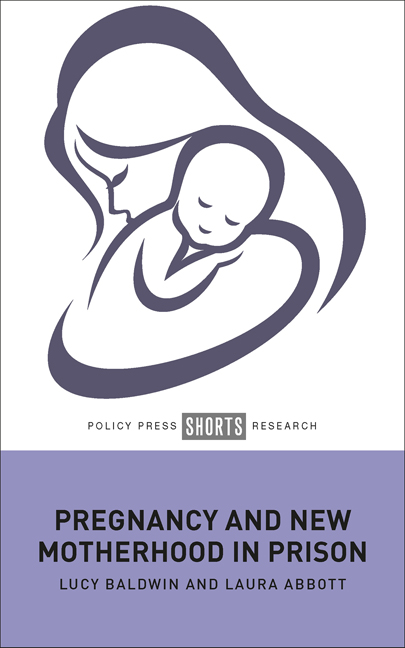Book contents
- Frontmatter
- Dedication
- Contents
- Acknowledgements
- ONE Context and landscape of pregnancy and new motherhood in prison
- TWO How we came to be here: 100 years of criminalised motherhood
- THREE The ‘journey’ to incarcerated motherhood
- FOUR Motherhood confined
- FIVE The persisting pain of incarcerated pregnancy and new motherhood
- SIX Personal experiences of pregnancy and motherhood in prison and the value of the voluntary sector in challenging the system
- SEVEN ‘Learning lessons’: discussion, concluding thoughts and recommendations
- Notes
- References
- Index
THREE - The ‘journey’ to incarcerated motherhood
Published online by Cambridge University Press: 03 April 2024
- Frontmatter
- Dedication
- Contents
- Acknowledgements
- ONE Context and landscape of pregnancy and new motherhood in prison
- TWO How we came to be here: 100 years of criminalised motherhood
- THREE The ‘journey’ to incarcerated motherhood
- FOUR Motherhood confined
- FIVE The persisting pain of incarcerated pregnancy and new motherhood
- SIX Personal experiences of pregnancy and motherhood in prison and the value of the voluntary sector in challenging the system
- SEVEN ‘Learning lessons’: discussion, concluding thoughts and recommendations
- Notes
- References
- Index
Summary
‘If I’d been able to get help sooner, I wouldn’t have even been in there and I would still have my baby … but no one was interested until I was pregnant – we didn’t stand a chance really.’
Emma Baldwin, 2015Introduction
Reflecting on the mothers’ narratives, this chapter will reveal the significance of mothers’ own experiences of being mothered as well as the circumstances and context of their lives before prison. The chapter will go on to reflect on the relationship between motherhood and desistance before exploring CJS responses to criminalised mothers.
The mothers’ experiences before criminalisation and/or prison: missed opportunities
For many criminalised pregnant and new mothers, the point at which they are sentenced or appear in court is often not their first foray into the CJS. Baldwin (2022b) describes a ‘Circle of Circumstance’ (see Figure 3.1), which is a common living space for women who will become criminalised. Most imprisoned pregnant and new mothers have experienced or are in the midst of experiencing multiple challenges, discrimination and disadvantage before they enter the prison space (Epstein et al, 2022). Baldwin’s (2022a, 2022b) research highlighted how, long before most of the mothers entered prison, there had often been multiple missed opportunities to support mothers differently. These missed and lost opportunities were often about responses to trauma, mental health, abuse, poverty and addictions, but significantly also around pregnancy, new motherhood and motherhood more generally. Torchalla et al (2014), in their study with women struggling with substance use during pregnancy and early motherhood, highlighted how participants had ‘experienced multiple and continuing forms of adversities and trauma, often in form of gender-based violence, in a variety of contexts, from a variety of offenders and on multiple levels’ (O’Malley et al, 2022: 3). As previously noted, and as argued by Clarke and Chadwick (2018), the focus of the CJS is too often to punish the individual, rather than understand or challenge the system which inflicts harm on women in contact with the CJS. This is despite the fact the ‘offender’ will almost certainly have been failed multiple times and by multiple agencies (Baldwin, 2015, 2021a, 2022a).
- Type
- Chapter
- Information
- Pregnancy and New Motherhood in Prison , pp. 36 - 60Publisher: Bristol University PressPrint publication year: 2023



